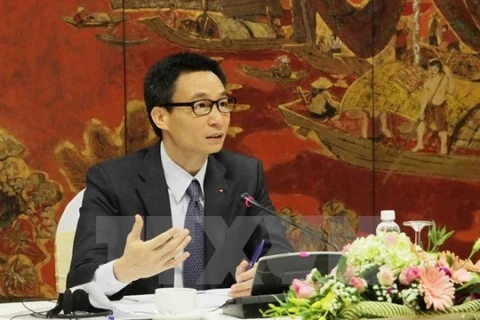 High school graduates sit for the national high school examination, which is also the university entrance exam (Photo: VNA)
High school graduates sit for the national high school examination, which is also the university entrance exam (Photo: VNA) Hanoi (VNA) - Prejudice and legal regulations cause major difficulties for non-State universities in Vietnam, chairwoman of the management board of Hanoi-based Thang Long University Hoang Xuan Sinh said.
Speaking at the conference on the current situation and solutions for non-State universities and colleges on December 22, Sinh said that although the first non-State universities were opened in Vietnam over 20 years ago and they contributed to the country in providing better human resources, people were still prejudiced against non-State universities.
“When it comes to non-State universities and colleges, people usually suppose that they enroll students with poor performance, deliver poor training service quality but with tuition fees much higher than public ones,” he said.
Graduates from non-State universities faced increased employer discrimination, he said.
Moreover, the current Law on Higher Education contained regulations that hindered the development of non-State universities.
For example, a regulation requires the Management Board of a non-State university to have one member who is a representative of authority of the locality where the university is based.
Meanwhile, non-State universities are overseen by ministries and agencies at provincial and city levels.
The then Prime Minister Phan Van Khai’s Decision 14/2005/QD-Ttg dated 2005 regulated that investors must ensure investment of at least 15 billion VND (660,000 USD) and average space of 10sq.m per student in order to open a private university.
The requirements are stricter as according to Decision 64/2013/QD-TTg dated 2013, the investment increased to 250 billion VND (11 million USD) not including criteria on space for school infrastructure.
Chairman of FPT University Le Truong Tung said that Government’s control for non-State universities was tightened in response to public concerns over the poor quality of enrollment and training by some non-State universities.
The Government tightened control as there were complaints that the number of non-State universities was increasing exponentially, but they were not, he said.
In the last 15 years, 43 non-State universities were opened while the number of public ones was 2.6 times higher.
Principal of Hanoi University of Business and Technology, Tran Phuong, said that Non-State universities are burdened by a number of pressures including finance, land funds, teaching facilities and staff.
While public universities are partially subsidised by operation funds, non-State universities have to manage on their own.
Phuong said that the Government should offer assistance to private universities, at least granting land or exempting them from land-use fees and land lease to build schools.
He said that Vietnam now spent about 20 percent of its budget on education and the rate would hardly increase as the country is tightening its belt.
“It’s indispensable for the Government to attract and engage the private sector more in education for the further development of the sector,” he said.-VNA
VNA
























